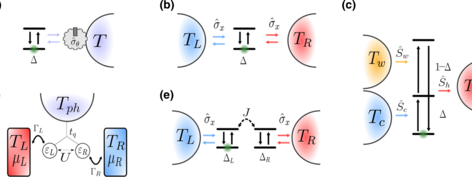Authors: Nicholas Anto-Sztrikacs, Ahsan Nazir, and Dvira Segal (CQIQC Member).
Abstract:
We present the reaction-coordinate polaron-transform (RCPT) framework for generating effective-Hamiltonian models to treat nonequilibrium open quantum systems at strong coupling with harmonic environments. Our approach, which is based on two exact transformations of the Hamiltonian followed by its controlled truncation, ends with a new Hamiltonian with a weakened coupling to the environment. This new effective Hamiltonian mirrors the initial one, except that its parameters are dressed by the system-bath couplings. The power and elegance of the RCPT approach lie in its generality and in its mathematical simplicity, allowing for analytical work and thus profound understanding of the impact of strong system-bath coupling effects on open-quantum-system phenomena. Examples interrogated in this work include canonical models for quantum thermalization, charge and energy transport at the nanoscale, and performance bounds of quantum thermodynamical machines such as absorption refrigerators and thermoelectric generators, as well as the equilibrium and nonequilibrium behavior of many-body dissipative spin chains.
Related links

